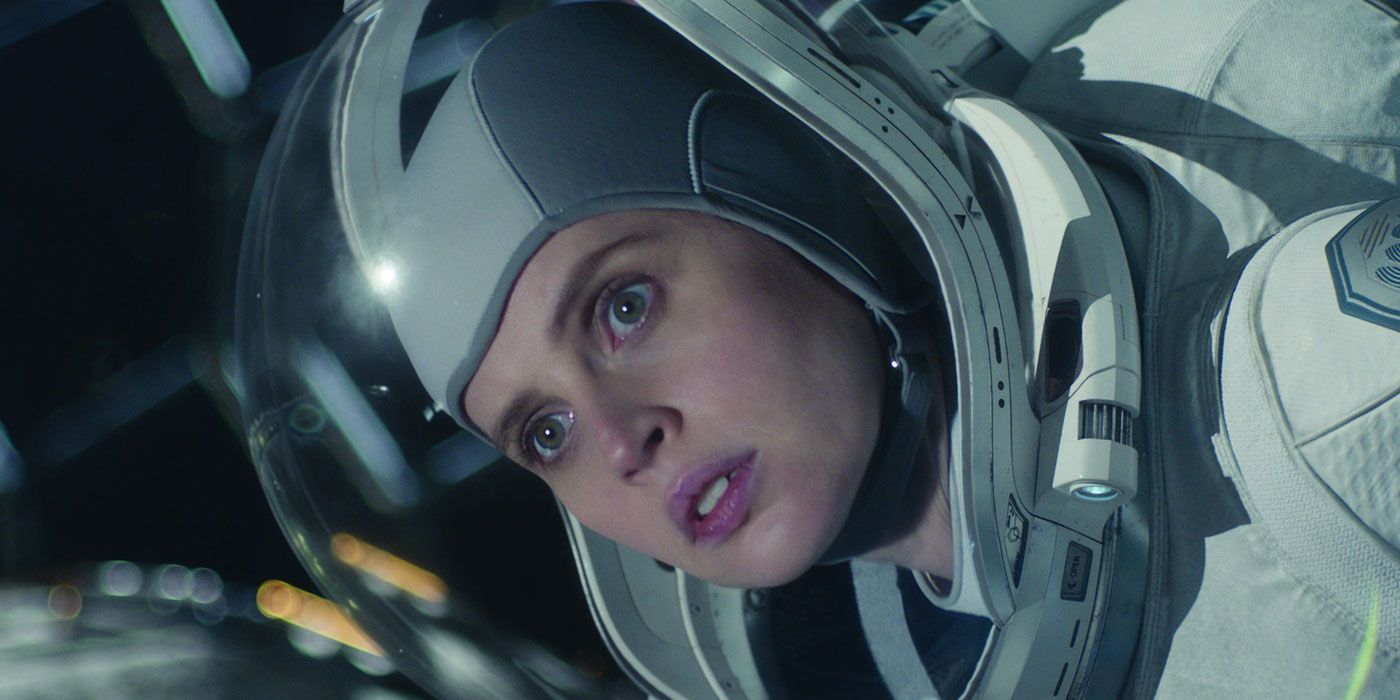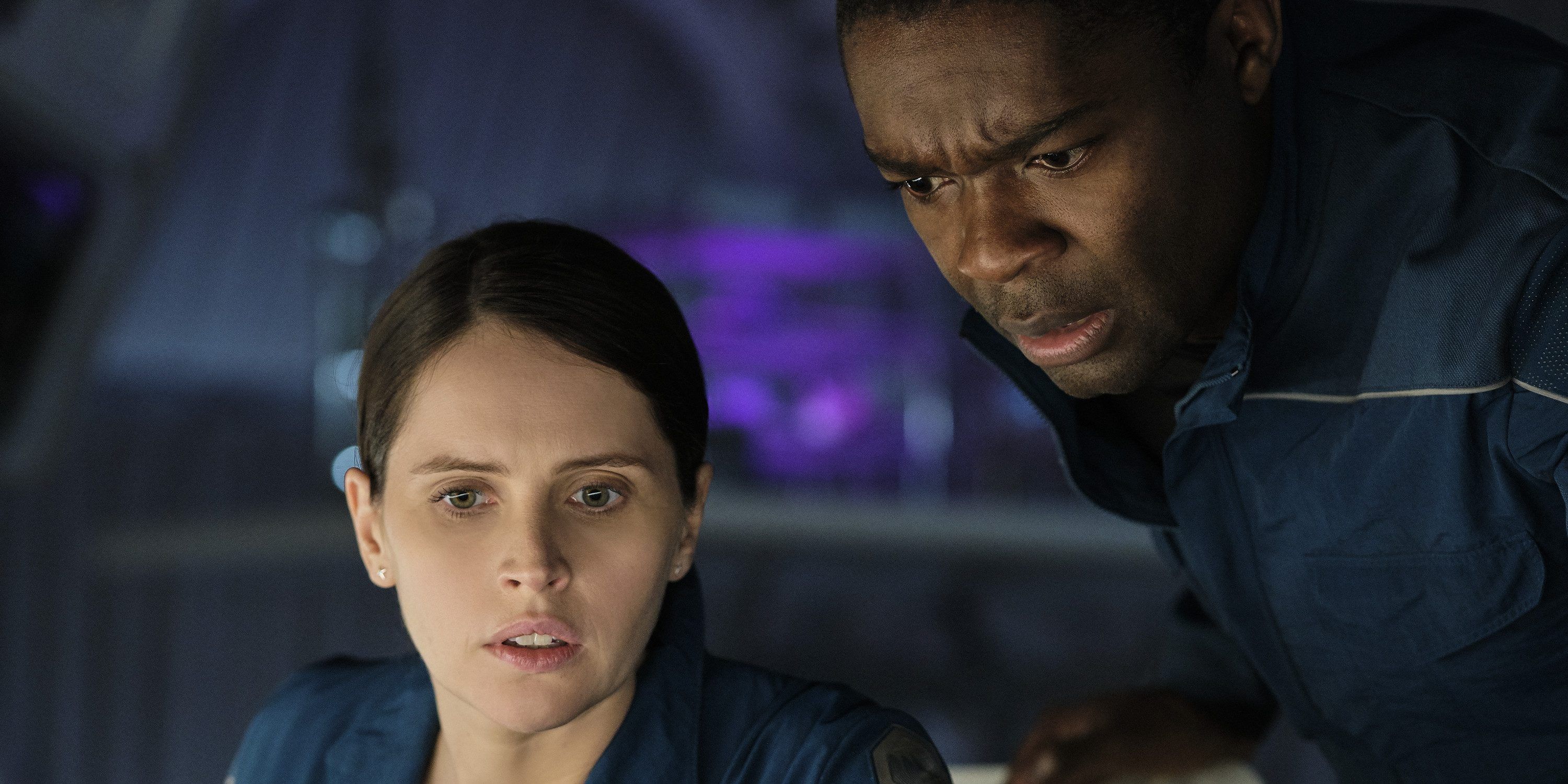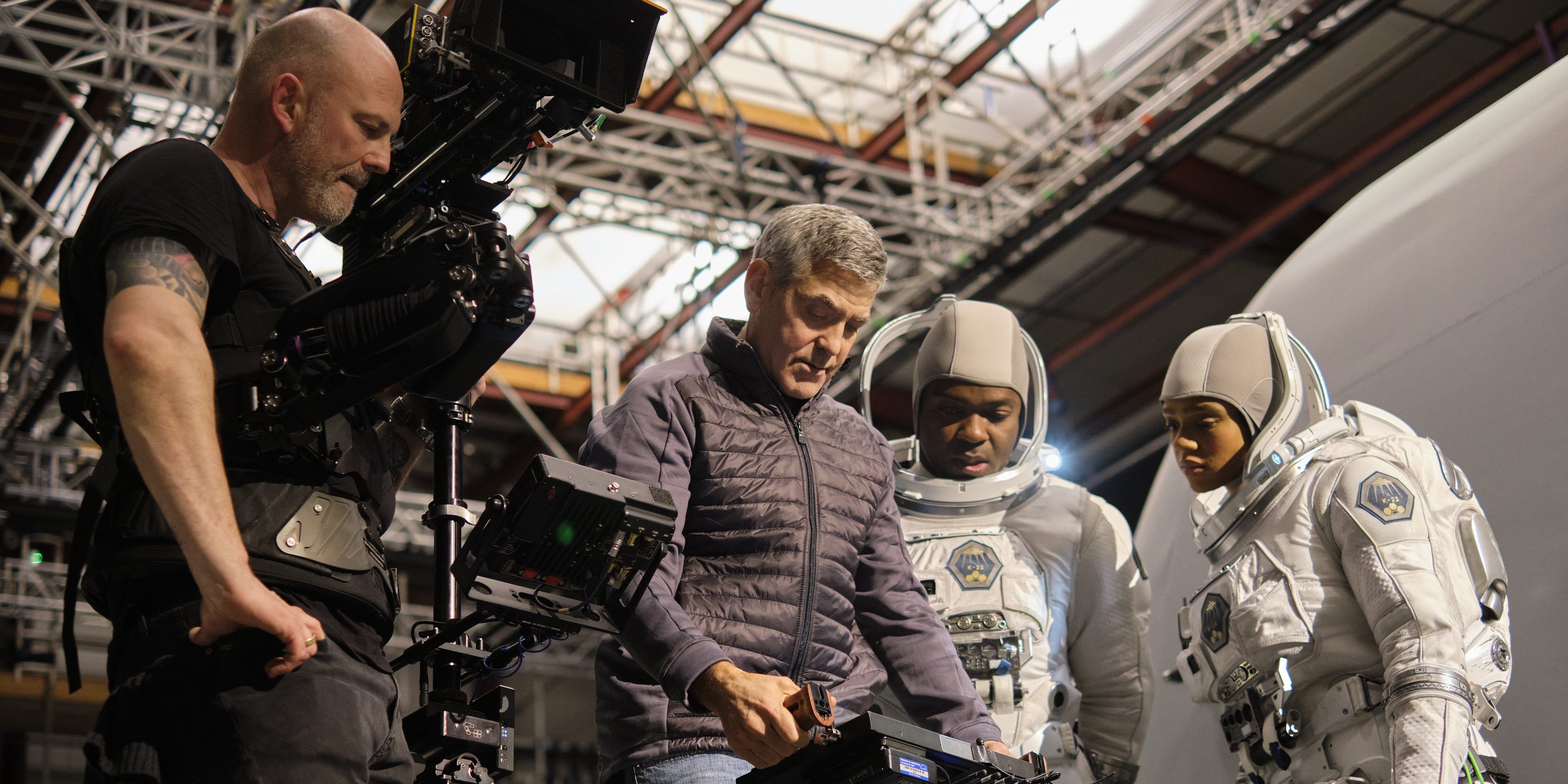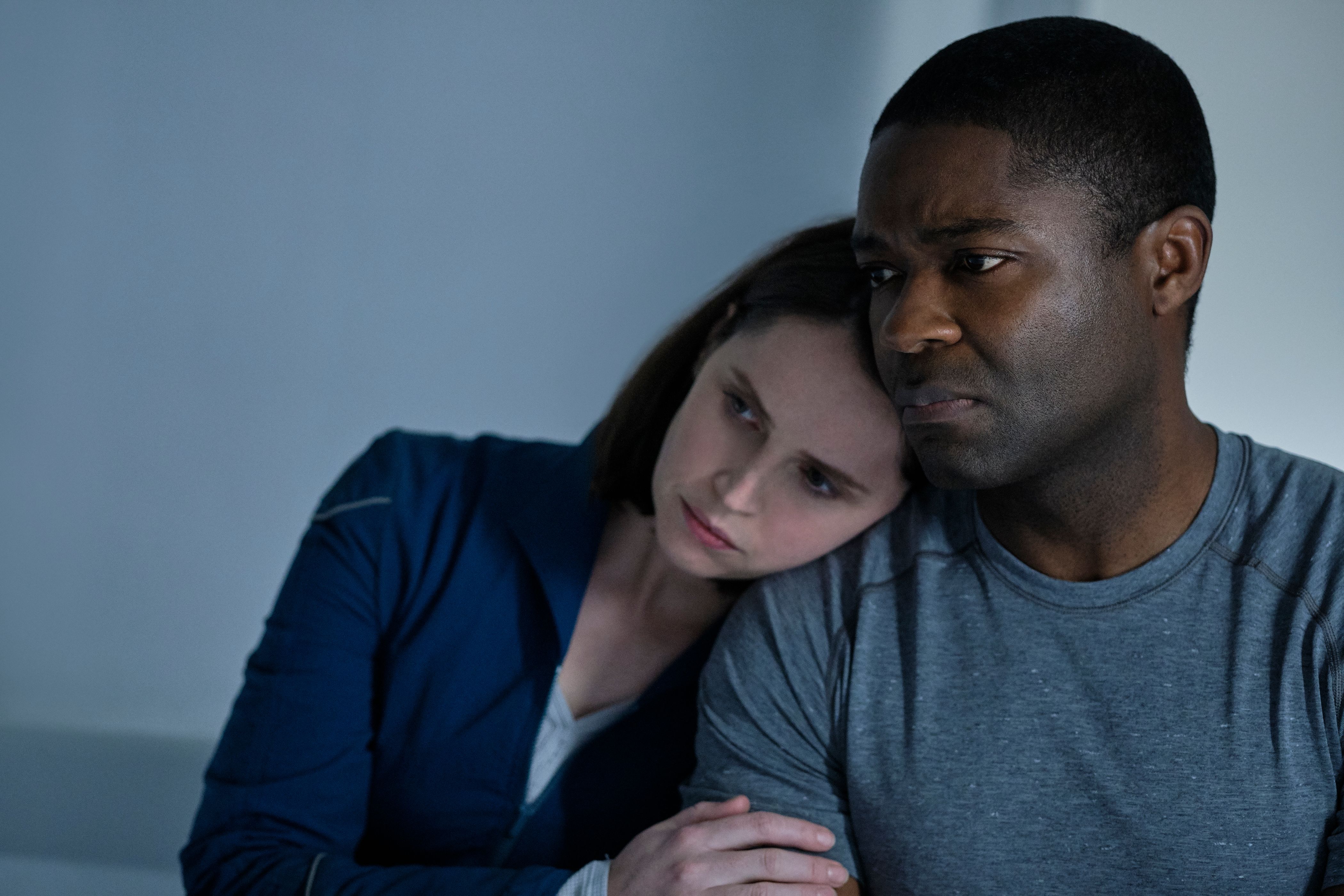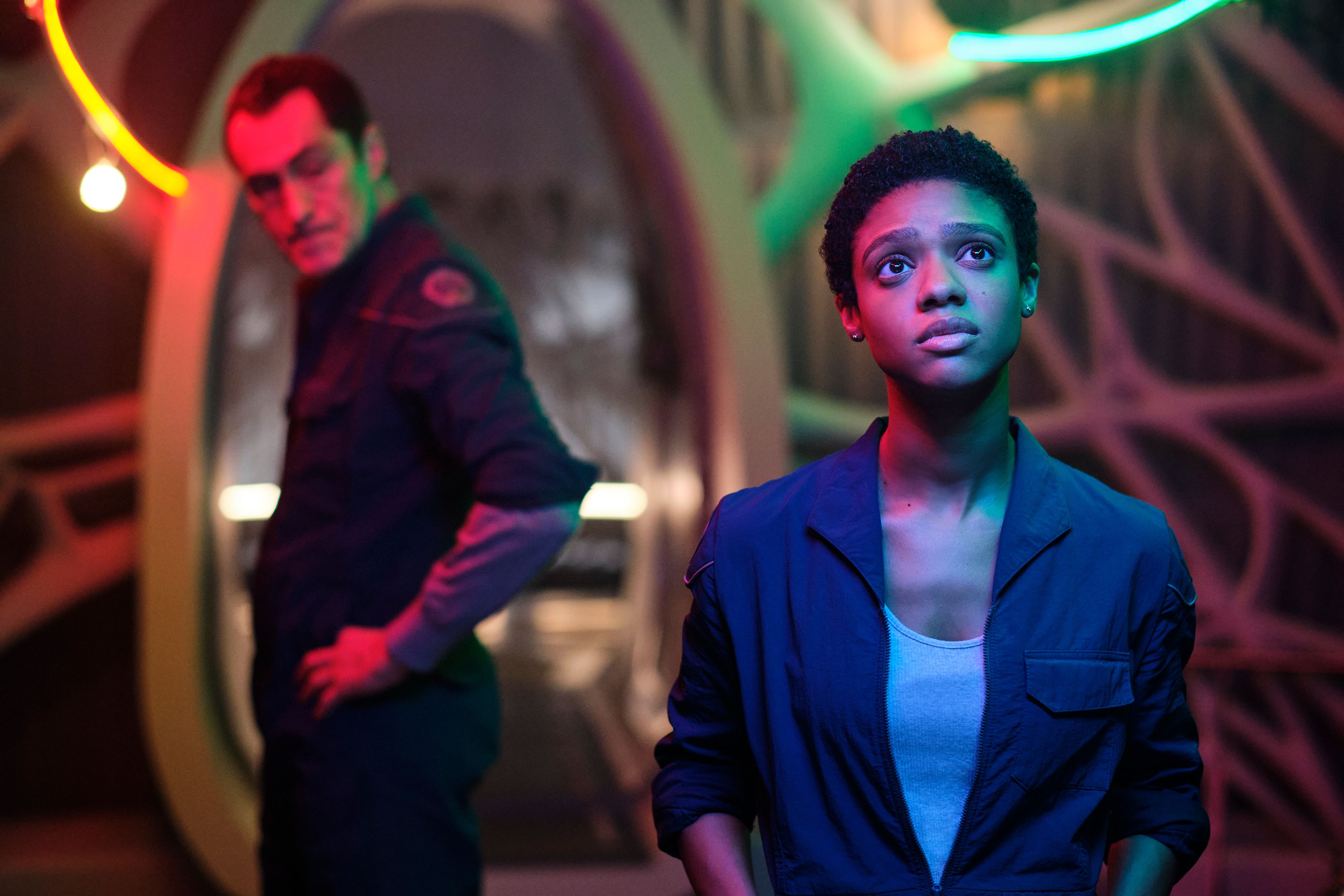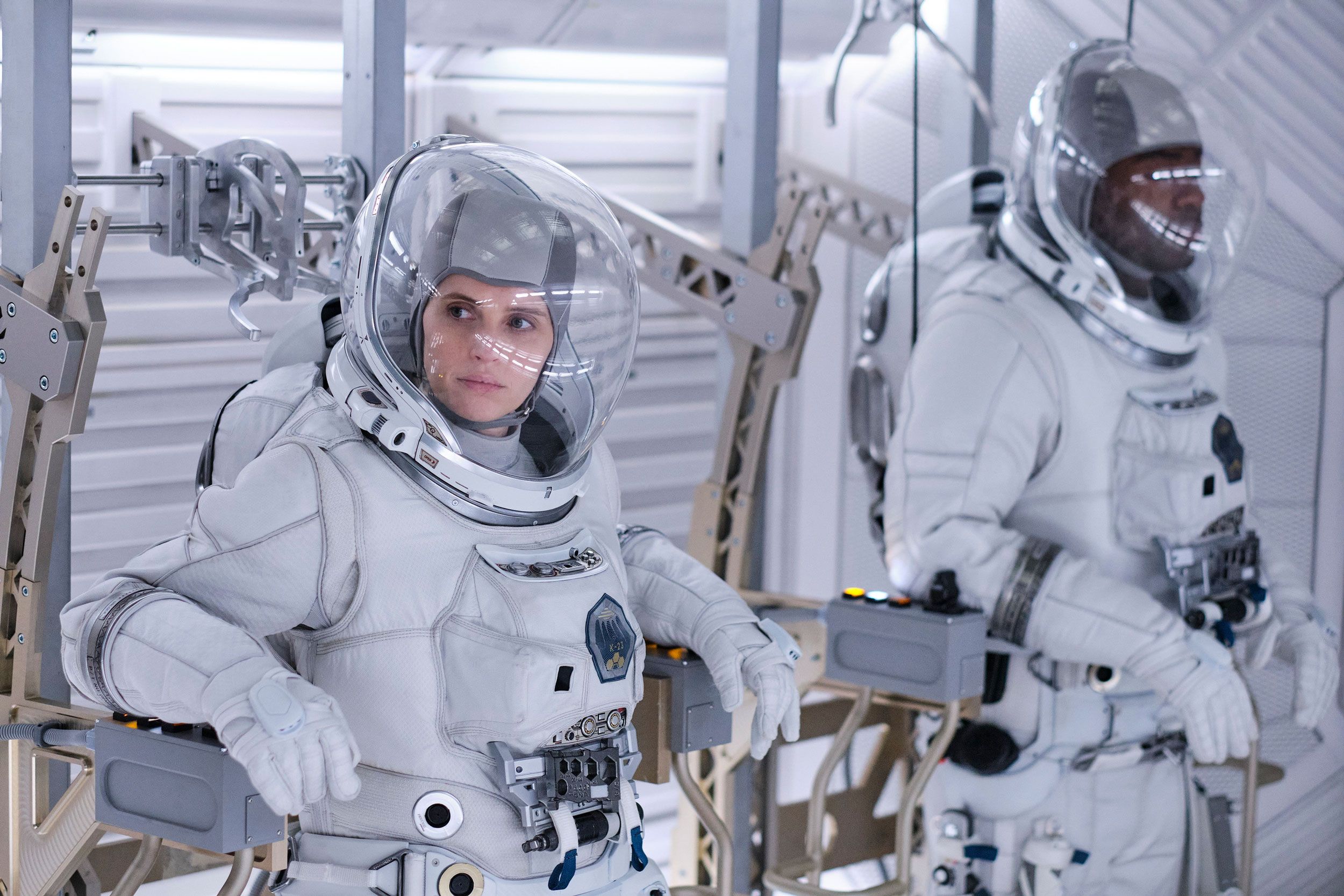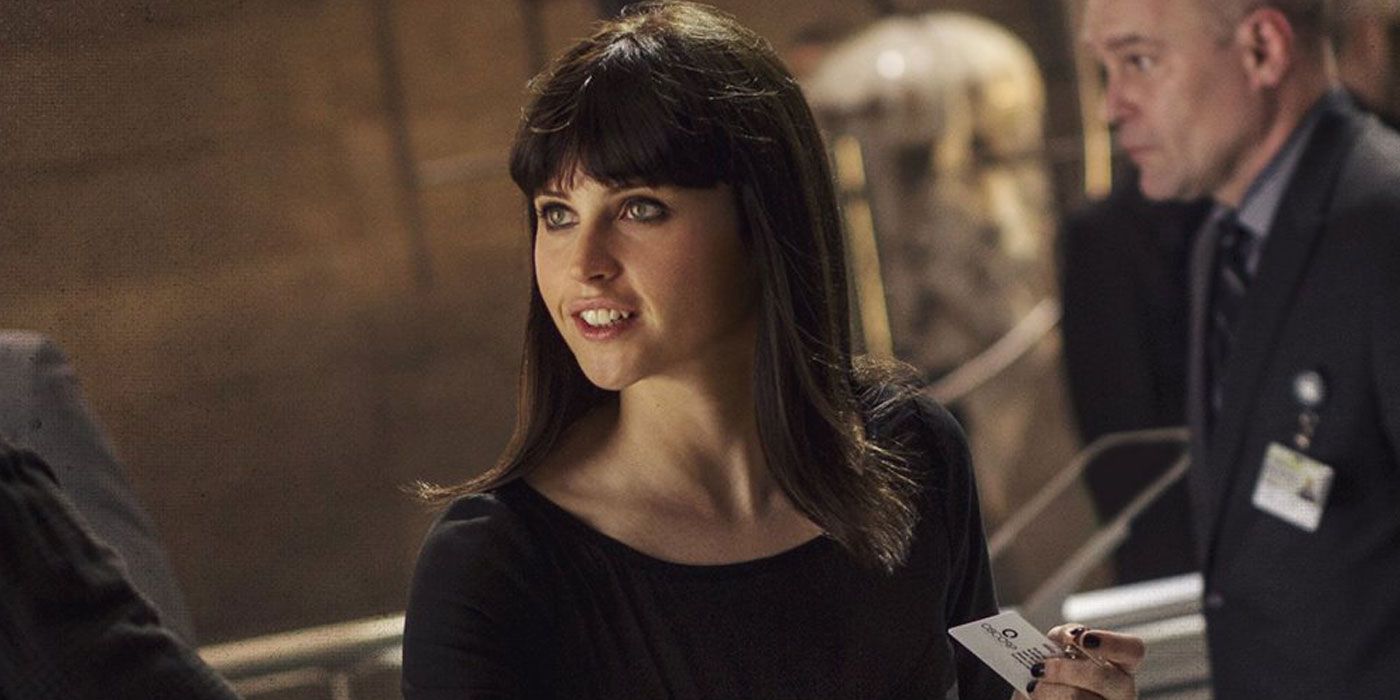[Editor's note: The following contains spoilers for The Midnight Sky.]
If you’ve got questions about George Clooney’s The Midnight Sky, you’ve come to the right place! Not only is the material itself a complex exploration of the value of human connection, but there was also a little bump in the production process - pun intended - that challenged Clooney and the team to adapt on the spot, Felicity Jones’ pregnancy.
Jones plays Sully in the movie, an astronaut aboard the Aether assigned to assess if Jupiter’s moon, K-23, is habitable. Meanwhile, back on Earth, a cataclysmic event is decimating the planet, forcing survivors underground. Clooney’s Augustine Lofthouse, however, opts to remain at his Arctic base. When Augustine realizes the Aether is on its way back, he becomes determined to make contact and warn them of the situation. When that finally happens at the end of the film, it’s revealed that Jones’ character is actually Augustine’s daughter. Their conversation seems to bring Augustine closure before his apparent passing, while a pregnant Sully and the father of her child, David Oyelowo’s Commander Adewole, turn the Aether around to keep the human race alive on K-23.
If you’ve got questions about that final father-daughter conversation, what it was like filming Maya’s (Tiffany Boone) chilling death scene and how Jones felt about changing the script so that her character was also pregnant, check out our full phone conversation below. Jones also shared a little bit about her new film, The Last Letter from Your Lover, and offered an update on her feelings about playing Marvel’s Black Cat.
I'm not sure if this is something that you do in general, but did you reach out to anyone you knew who had worked with George as a director to ask about the experience?
FELICITY JONES: Well, interestingly, I went to a screening of his TV series, Catch 22, which I thought was excellent. I thought it was just wonderfully directed, beautiful acting, really moving but it had humor in it, which is what he brings to everything he does. And that was my first meeting with him. He was there and we met afterwards and chatted. So I got to know George through his work primarily, which is always the best way.
Is there anything he did on set as a director that surprised you?
JONES: I was very impressed with his focus, and he knows the story he's telling inside out. He has incredible vision [for] what he's doing. He knows exactly which shots he wants and when he wants them. And there's great respect for him on set. Ultimately, like us all, he loves what he does and doesn't take it for granted.
I did want to ask about how the pregnancy changed the character and the production process if that's okay.
JONES: Yeah, of course! The way I was preparing the character, her being pregnant didn't actually make a huge amount of difference. So it felt like it was destined to be in many ways. It was a very organic, very harmonious process. Originally we were going to remove the bump, CGI the bump, and then after looking at footage George felt that actually it would really enhance the story and really contribute. It adds a really wonderful element. I mean, the whole film is about family and connection and legacy and what has meaning, and Sully being pregnant just adds to that storyline. So it felt like it was meant to be.
At what point in the process did you mention that to George and the team? Was it before you officially signed on for the role?
JONES: I told them as soon as it was safe to tell them. George and I had already been having a creative dialogue up until that point, and so it was a very easy conversation to have in many ways. I'm sure for them there was a lot of figuring out, ‘Okay, how do we adapt to this?’ But for my end, they made it as seamless as possible, which was a great relief. I hope people will take hope from this, women who work who are pregnant will see that it is possible, that people like George are leading the way in making sure that we do keep our jobs.
Was there ever a version of the script that was true to the book with Sully having had her child who’s on Earth throughout all of this?
JONES: There's quite a lot of adaptations from the book. That's what's so interesting is that obviously in the DNA of the story, there is a parent child relationship, which is then obviously echoed by George and my relationship, that I'm obviously his daughter. And so thematically it's very much in the core of the story. So it's interesting you say that. Obviously by making Sully pregnant we were able to reinforce what was actually originally in the book thematically.
It's fascinating how a script is never a solid thing. It shifts and changes and adapts. Ultimately it's a starting off point and you always have to see it as a malleable force. It has to shift to the moment, to the situation. Once you're shooting something then you're creating a new reality. And we were lucky that we were able to make the film in that way with such sort of modernity and flexibility.
Is there any specific bit of Sully's reality that you weren't able to find until you were on set experiencing it?
JONES: You prepare and prepare and prepare [laughs], but [there’s] nothing like actually being on set in front of a camera, and suddenly you have an audience as well. It's not too dissimilar from theater making a film; you still have an audience who's the crew. So there's always something that happens in the moment that you're not expecting. It's just, you have to be prepared enough to be open to that, I guess. Definitely you might come into a story having one idea in your head and then when you’re actually on set, you want to be open to something spontaneous happening. That’s sort of what makes it exciting.
How about working with David? Did the two of you discuss any backstory for the romance between your characters?
JONES: The book was a great resource for that. There’s a romance that is one that sort of simmers quietly. It's a relationship born out of great respect for one another. I think they're people who have definitely [taken] that and, to an extent, been on the run. I think there's a reason why people become astronauts and go into space, and often it is an escape. And I think things haven't necessarily worked out for them on Earth so they feel a great freedom being in space and looking out on that nothingness, and having that perspective looking back on Earth. I think it gives them a confidence and a sure footing, which they probably never had in their lives. And there was more dialogue about what they've been doing on Earth, but you sort of didn't need it. It didn't feel like you needed it in that final cut. And then again, them having a baby just adds to the uniqueness of that relationship in space because obviously we haven't ever seen that before.
I did want to ask about filming Maya's death scene. The suspended blood droplets might be one of the most haunting things I've seen in a while. How does George set the scene for you so you can feel the horror of the moment while you're filming it, even if certain elements aren’t really there?
JONES: Just as a side point, I was watching the film again recently and it was amazing how the blood that is in those tubes when George is doing his chemotherapy, and then obviously the blood ties to that scene. So much of the film is about blood and it's about family, about what is the meaning of family. It was interesting as I was watching it and realizing how strong [of a] visual motif it is and obviously how it becomes a metaphor for the underlying stories in the film.
But in terms of the tension of that scene, it’s always just rehearsal, rehearsal, rehearsal. We did that many, many times with the stunt crew, with George. The key to any kind of calamity scene - and actually, George obviously is very experienced in this from doing ER, and he would often just talk about ER as a reference point - is that you almost have to not have all the answers. As soon as it gets too perfect and choreographed, it looks a bit unreal. So it's keeping the element of danger and that these people are panicking and things aren't going to plan and keeping a shakiness to it. And that's what George was keen to do in the direction of that scene was just not let it get over choreographed in any way. But it was one of the tougher sequences because you had, particularly for David, Tiffany and [me], the three of us we're in a very small space trying to make this moment work without sort of bashing into each other and injuring each other was quite tough.
How about filming the close-ups with Tiffany in Maya's last moments? That's a lot of heavy lifting on her end, so what can you do for her as a scene partner to best support her work in a moment like that?
JONES: You just have to believe. You both have to suspend disbelief and believe in the veracity of that moment. And it did, it felt very moving as we were doing it because we shot it towards the end of the schedule. We had all bonded. We had become like shipmates, so that added to the investment and the feeling of love when Maya dies. But it's always easier when you have great actors and everyone on the ship is excellent, and that obviously makes everyone's jobs a lot easier.
Does Sully have any inkling whatsoever that she's talking to her father in that final scene?
JONES: Yeah, I think definitely. It’s probably subconscious, but she has a sense of who this man is. I think she's had a feeling her whole life that he's important in some way. And I think definitely that somewhere in her she knows the importance of that relationship. That's what I loved about reading the script. I just found that storyline so moving and so much of the story is about parenthood and looking back at one's life and particularly for George's character, thinking what is important? What does it all add up to? And you get that in those sequences where they're all looking out into space into that nothingness and it forces them to go, ‘Well, what actually is important? What has meaning?’ And in the end, it is connection. I mean, as we're finding now, I think connection is everything.
What do you think is the main theme of the movie while you're playing it and also while you're watching it? The value of human connection and the general focus on survival are both strong, but does one or the other need to be in the forefront of your mind while you're filming?
JONES: Well, they're very different. When you're in the day-to-day of it, you're breaking down the character's backstory, what is getting them from one moment to the next, what is driving that person, what is motivating them. And it is quite a micro analysis of a single person. You have to become an expert in that character, and you defend that character all the way through. You are their advocate. But when I watch it as a viewer, then, as I was saying with the blood, you start to see the bigger themes of this story and what makes it relevant. And it is, it is about isolation and the need for meaning in one's life and the importance of meaning in one's life through personal connection. I don't think that necessarily has to be family, but the connection of one human to the other is what will last us really, is that love.
What's your take on the tone of the ending? Do you find it more hopeful or melancholic?
JONES: I think it's very true. There’s hope in the future and new life, but at the same time, as you say, there is a melancholy. It's very reflective. It's bittersweet, isn't it?
Have you and David put much thought into life after the events of the movie for your characters? They’re left with a lot on their shoulders. Can they really start a new life elsewhere?
JONES: Oh, I think definitely. I think there's another colony in K23 that they discover and the human race continues. We're pretty hardy, the human race. We keep going in very difficult circumstances so I have great hopes for their survival.
Before we wrap up, I did want to ask about Last Letter from Your Lover. As a big fan of Augustine [Frizzell]’s, in particular Never Goin’ Back, I’m looking forward to it but I wouldn’t necessarily connect the dots between her past work and this type of film. Will we see Augustine's voice shine through in a similar way that it did in that movie?
JONES: Yeah, definitely. I think that's what was so exciting about Augustine directing that book was that, as you say, she brings an anarchy and she brings a very modern touch. There's a sort of dangerous quality to her direction, which is really important. And with this story, it was important that it had someone who was going to bring an edge to it ultimately, which she has absolutely done and made a beautiful film. And it's a film that is about love. It’s two storylines. It's Shailene Woodley who plays a women in the sixties, and I play a contemporary character and it's their stories intertwined in their search for hope, for love and finding who they are and what is important to them.
And lastly, I must ask - if given the opportunity, is your character in Amazing Spider-Man 2 something you would like to return to? And is there any element of that character that wound up going unused or on the cutting room floor that you would like to explore more?
JONES: [What] I always liked about that character was the physicality. I thought it would be amazing to explore that side of the character. Black Cat has that incredible way of moving and that's what made me really excited about it. I mean, I think it's a fab role and, yeah, it would be amazing to do.

